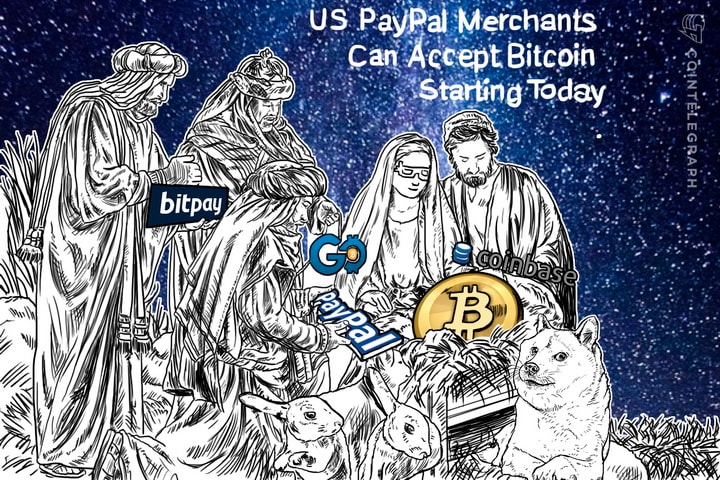The excitement around PayPal’s first foray into Bitcoin via Braintree is barely over, but now the company has announced its merchants will be able to opt to accept Bitcoin as payment – from today.
In a unexpectedly quick move, PayPal Senior Director of Corporate Strategy Scott Ellison announced partnerships with Coinbase, BitPay and GoCoin to facilitate immediate Bitcoin functionality to the first round of merchants based in North America.

“Today we are announcing PayPal’s next step in helping merchants accept Bitcoin payments. PayPal has entered into agreements with leading Bitcoin payment processors BitPay, Coinbase and GoCoin,” Ellison writes in a press release. “Starting today, these agreements let PayPal digital goods merchants accept Bitcoin with a simple integration through the PayPal Payments Hub.”
“Today we are announcing PayPal’s next step in helping merchants accept Bitcoin payments. PayPal has entered into agreements with leading Bitcoin payment processors BitPay, Coinbase and GoCoin.”
The advancement will take the form of an opt-in feature merchants can enable, and PayPal makes it clear that the process is not tantamount to complete integration.
“… Today’s news does not mean that PayPal has added Bitcoin as a currency in our digital wallet or that Bitcoin payments will be processed on our secure payments platform,” Ellison says. “PayPal has always embraced innovation, but always in ways that make payments safer and more reliable for our customers. Our approach to Bitcoin is no different.”
He added however that the options for future development remain very much open:
“That’s why we’re proceeding gradually, supporting Bitcoin in some ways today and holding off on other ways until we see how things develop.”
The press release contains what appear to be reassurances that any dealings with Bitcoin are being carried out according to the letter of the law, and that adherence to legislation will be the main conditioning factor governing the pace and extent of future roll-outs.

Given the international presence of its Bitcoin industry partners, however, it seems safe to say that the North American market will not be alone for long.
GoCoin, which recently rolled out its payment processing service to over one thousand international businesses, is a particularly interesting addition, working extensively with Litecoin and Dogecoin payments.
“GoCoin will be launching a number of new coins in the coming month. It will be the option of the merchants which they elect to accept. From our perspective they should accept all because we insulate them from the risk,” GoCoin CEO Steve Beauregard told Cointelegraph via email.
PayPal’s strategy would thus indeed point to consideration of the community beyond Bitcoin. Making any acceptance optional provides a significant test environment, where uptake will be measured without risk.
“In my view, PayPal has done their homework to understand the benefits to their merchants of accepting digital currencies. They are also being very strategic in partnering with the big three industry leaders each with very different approaches and with different vertical market focus,” Beauregard continues.
“The ultimate decision which digital currency payments processor is selected will be in the hands of the merchants yet PayPal will benefit in all cases.”
PayPal meanwhile also mentioned it will continue its preexisting support for Bitcoin mining equipment sales, but will stop short of working with providers who pre-sell prior to release.
“This is consistent with our approach to pre-sales of other goods; we hold off anytime we determine that pre-selling may not provide a good buyer experience,” Ellison explains.
The latest news is set to reshape the community response to Bitcoin acceptance among major fiat-based payment entities. The classic discussion of how Bitcoin ‘is better’ than PayPal, in particular, will take on a different form as the two options slowly become more extensively amalgamated.
What remains to be seen is how Bitcoin, or indeed other currencies in future, will be supported at the customer level; whether the knowledge is in place to deal with a new area of queries, complaints and disputes, and the realities of integrating Bitcoin’s ideals with PayPal’s own.
Did you enjoy this article? You may also be interested in reading these ones:


